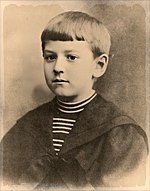Portal:Speculative fiction/Horror

Selected horror profile
Howard Phillips Lovecraft (August 20, 1890 – March 15, 1937) was an American author of horror, fantasy, and science fiction, especially the subgenre known as weird fiction.
Lovecraft's guiding literary principle was what he termed "cosmicism" or "cosmic horror", the idea that life is incomprehensible to human minds and that the universe is fundamentally alien. Those who genuinely reason, like his protagonists, gamble with sanity. As early as the 1940s, Lovecraft had developed a cult following for his Cthulhu Mythos, a series of loosely interconnected fiction featuring a pantheon of human-nullifying entities, as well as the Necronomicon, a fictional grimoire of magical rites and forbidden lore. His works were deeply pessimistic and cynical, challenging the values of the Enlightenment, Romanticism, and Christian humanism. Lovecraft's protagonists usually achieve the mirror-opposite of traditional gnosis and mysticism by momentarily glimpsing the horror of ultimate reality and the abyss. Although Lovecraft's readership was limited during his life, his reputation has grown over the decades, and he is now regarded as one of the most influential horror writers of the 20th century. According to Joyce Carol Oates, Lovecraft — as with Edgar Allan Poe in the 19th century — has exerted "an incalculable influence on succeeding generations of writers of horror fiction". Stephen King called Lovecraft "the twentieth century's greatest practitioner of the classic horror tale." Selected horror workThe Mummy is a 1999 American adventure film written and directed by Stephen Sommers and starring Brendan Fraser, Rachel Weisz, John Hannah and Kevin J. O'Connor, with Arnold Vosloo in the title role as the reanimated mummy. The film features substantial dialogue in ancient Egyptian language, spoken with the assistance of a professional Egyptologist. It is a loose remake of the 1932 film of the same name which starred Boris Karloff in the title role. Originally intended to be part of a low-budget horror series, the movie was eventually turned into a blockbuster adventure film. Filming began in Marrakech, Morocco, on May 4, 1998, and lasted seventeen weeks; the crew had to endure dehydration, sandstorms, and snakes while filming in the Sahara. The visual effects were provided by Industrial Light & Magic, who blended film and computer-generated imagery to create the titular Mummy. Jerry Goldsmith provided the orchestral score. The Mummy opened on May 7, 1999, and grossed $43 million in 3,210 theaters; the movie went on to gross $416 million worldwide. Reception to the film was mixed, with reviewers alternatively praising or complaining about the special effects, the slapstick nature of the story and characters, and the stereotyped villains. The box-office success led to a 2001 sequel, The Mummy Returns, as well as The Mummy: The Animated Series, and the prequel film The Scorpion King. Another sequel, The Mummy: Tomb of the Dragon Emperor, opened on August 1, 2008. Universal Studios also opened a roller coaster, Revenge of the Mummy, in 2004. The movie and its sequel's novelizations were written by Max Allan Collins. Horror topics
|


